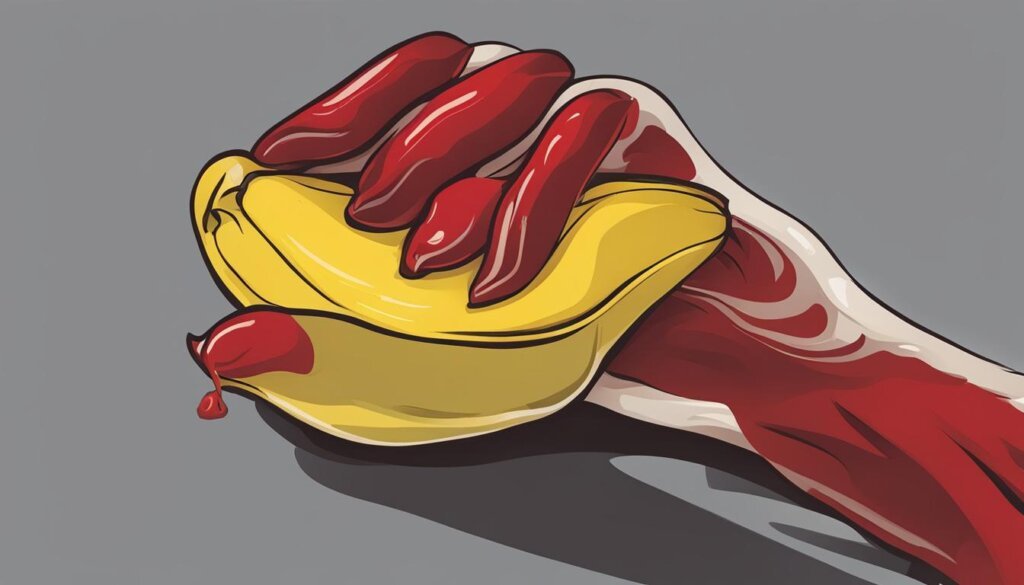Many pet owners enjoy treating their dogs to human food from time to time. But what about banana peppers? Can dogs eat banana peppers safely without suffering any adverse effects? While some dogs can tolerate banana peppers without any problems, others may experience digestive issues, allergic reactions, or other health problems. In this article, we’ll explore everything you need to know about banana peppers and their potential impact on your dog’s health. From the nutritional value of banana peppers to the potential risks and benefits, we’ll provide a thorough and comprehensive guide to feeding your furry friend this spicy treat.
Key Takeaways:
- Dogs can eat banana peppers in moderation, but individual tolerance may vary.
- Some dogs may experience digestive issues or allergic reactions to banana peppers.
- Banana peppers provide little nutritional value and can be high in sodium if pickled.
- Puppies may have more sensitive digestive systems and should be introduced to banana peppers with caution.
- Consult with your veterinarian before adding banana peppers to your dog’s diet.
Case Study: Bella’s Allergic Reaction to Banana Peppers

In a case study of a 3-year-old Labrador Retriever named Bella, it was observed that she had a severe allergic reaction to banana peppers. Bella experienced swelling, itching, and scratching all over her body after consuming banana peppers. This highlights the potential risks of feeding banana peppers to dogs, especially those who may be allergic to them.
This case study emphasizes the importance of pet owners being aware of the signs of an allergic reaction in their dogs and seeking immediate veterinary care if necessary. It serves as a reminder that even seemingly harmless foods can have adverse effects on certain individuals, and it’s crucial to monitor our pets’ well-being and provide appropriate medical attention when needed.
Can Dogs Eat Banana Peppers?
Dogs can eat banana peppers, but it’s important to do so in moderation. While banana peppers are not toxic to dogs, they provide little nutritional value and can be high in sodium if pickled. Excessive sodium intake can lead to health problems in dogs, such as dehydration and high blood pressure. Therefore, it’s crucial to offer your furry friend only small amounts of banana peppers as an occasional treat, rather than a regular part of their diet.
When feeding your dog banana peppers, it’s vital to remove the stem and seeds, as these parts can pose a choking hazard. Additionally, it’s essential to avoid seasoning or spicing the banana peppers, as many seasonings and spices can be harmful or even toxic to dogs. Consulting with your veterinarian before introducing any new food to your dog’s diet is always recommended, as they can provide guidance based on your dog’s specific needs and health conditions.
Remember, every dog is different, and some may have specific allergies or sensitivities to banana peppers. It’s essential to watch for any signs of digestive upset, allergic reactions, or discomfort after feeding your dog banana peppers. If you notice any adverse effects, it’s best to discontinue feeding them this spicy treat and consult with your veterinarian for further guidance.
| Nutritional Value of Banana Peppers | Amount per 100g |
|---|---|
| Calories | 27 |
| Carbohydrates | 5.3g |
| Fiber | 2g |
| Protein | 1g |
| Fat | 0g |
| Vitamin C | 93mg |
| Sodium | 1mg |
Table: Nutritional Value of Banana Peppers
While banana peppers are low in calories and high in vitamin C, dogs typically obtain enough vitamin C from their regular diet. The fiber content in banana peppers can aid in digestion, but it’s essential to balance their intake with other sources of fiber. It’s crucial to note that banana peppers pickled in vinegar may be high in sodium, which can be harmful to dogs in large amounts. Therefore, it’s best to offer banana peppers to your dog in their fresh, raw form, without any additional seasonings or preparations.
In summary, dogs can eat banana peppers, but it’s crucial to do so in moderation and with caution. Always prioritize your dog’s well-being and consult with your veterinarian if you have any concerns or questions regarding their diet. By being mindful of your dog’s individual tolerance and health needs, you can safely incorporate banana peppers into their occasional treat options.
Can Puppies Eat Banana Peppers?
When it comes to feeding banana peppers to puppies, caution is advised. Puppies have different nutritional needs compared to adult dogs, and their digestive systems may be more sensitive. It’s important to introduce new foods gradually and monitor their reactions closely.
Start by offering a small piece of banana pepper to your puppy and observe how they respond. Look for any signs of gastrointestinal upset, such as vomiting, diarrhea, or discomfort. If your puppy shows any adverse reactions, it’s best to avoid feeding them banana peppers altogether.
Consulting with your veterinarian is always a good idea before introducing any new food to your puppy’s diet. They can provide guidance based on your puppy’s specific needs and health condition. Your vet will be able to recommend appropriate portion sizes and frequency of feeding banana peppers, if at all.

In summary, while puppies can eat banana peppers, it’s important to approach it with caution. Every puppy is different, and what works for one may not work for another. As responsible pet owners, we must prioritize our puppies’ health and well-being by providing them with a balanced and appropriate diet.
Nutritional Value of Banana Peppers
When considering whether to feed your dog banana peppers, it’s important to understand their nutritional value. Banana peppers are low in calories, making them a suitable treat option for dogs watching their waistlines. These peppers are also rich in vitamin C, which contributes to a healthy immune system. However, it’s essential to note that most dogs receive adequate vitamin C through their regular diet, so the additional vitamin C from banana peppers may not be necessary.
Additionally, banana peppers contain fiber, which aids in digestion and can help regulate your dog’s bowel movements. This is particularly beneficial for dogs with gastrointestinal issues or irregular bathroom habits. However, it’s crucial to feed banana peppers in moderation as part of a well-balanced diet, as excessive consumption can lead to gastrointestinal upset.
Benefits of Banana Peppers for Dogs
Banana peppers offer several potential benefits for dogs when consumed in moderation. These include:
- Boosting the immune system
- Promoting heart health
- Providing a low-calorie treat option
- Aiding digestion with their fiber content
These benefits, combined with the spicy flavor that many dogs enjoy, make banana peppers an occasional and enjoyable addition to your dog’s diet. However, it’s important to remember that every dog is unique, and some may have sensitivities or allergies to banana peppers. Always monitor your dog’s reaction and consult with your veterinarian if you have any concerns.
| Nutrient | Amount per 100g |
|---|---|
| Calories | 29 |
| Vitamin C | 127.7mg |
| Fiber | 2.9g |
| Sodium | 1.8mg |
Table: Nutritional value of banana peppers per 100g
As shown in the table above, banana peppers are relatively low in calories and sodium, making them a healthy treat option for dogs. The high vitamin C content provides an immune system boost, while the fiber promotes proper digestion. However, it’s important to be mindful of portion sizes and consider your dog’s specific dietary needs and health conditions before introducing banana peppers into their diet.
Conclusion
In conclusion, when it comes to feeding banana peppers to dogs, moderation is key. While banana peppers are generally safe for canine consumption, it’s important to consider your dog’s individual tolerance, potential allergies, and overall health. Some dogs may experience digestive upset or allergic reactions, so it’s crucial to monitor their reaction closely. If any adverse effects occur, it’s best to consult with your veterinarian.
When offering banana peppers to your dog, remember to feed them in small amounts and remove the stem and seeds. Avoid adding any seasonings or spices, as these can be harmful to your dog’s health. Additionally, be aware that pickled banana peppers can be high in sodium, which can be detrimental to dogs if consumed in large quantities.
While banana peppers do provide some nutritional value, such as fiber and vitamin C, it’s important to note that dogs typically obtain enough of these nutrients from their regular diet. Therefore, banana peppers should be considered as an occasional treat rather than a regular part of their daily meals. Always prioritize your dog’s well-being and consult with a professional if you have any concerns or questions.
FAQ
Can dogs eat banana peppers?
Dogs can eat banana peppers, but it’s important to do so in moderation.
Are banana peppers safe for dogs?
Banana peppers are generally safe for dogs, but some may experience digestive upset or allergic reactions.
Can puppies eat banana peppers?
Puppies can eat banana peppers, but it’s important to do so with caution and monitor their reaction.
Do banana peppers provide any nutritional value for dogs?
Banana peppers are low in calories and high in vitamin C and fiber, but they should be fed in moderation as dogs typically get enough vitamin C from their regular diet.
Can dogs have pickled banana peppers?
Pickled banana peppers may be high in sodium, which can be harmful to dogs in large amounts. It’s best to avoid pickled banana peppers or feed them sparingly.
What should I do if my dog has an allergic reaction to banana peppers?
If your dog has an allergic reaction to banana peppers, such as swelling, itching, or scratching, seek immediate veterinary care.
Should I consult with a veterinarian before feeding my dog banana peppers?
Yes, it’s always advisable to consult with your veterinarian before introducing any new food to your dog’s diet, including banana peppers.

